17 dec 2016

The Palestinian MP and head of the popular committee against the siege Jamal Khudari warned in a statement issued on Friday that Israel’s siege on Gaza has caused heavy losses to the commercial and industrial sectors.
The 10-year siege has targeted all elements of economic progress and economic development, he said.
The Israeli authorities continue to prevent the entry of nearly 400 commodities into Gaza Strip in addition to the construction materials, which delays Gaza reconstruction, according to his statement.
He pointed out that thousands of people are still homeless although more than two years have passed since the Israeli war on the Strip came to an end.
Over a million and a half of million Palestinians in Gaza rely on humanitarian aid, Khudari added.
The independent MP concluded by calling on the international community to work urgently toward ending the Israeli siege and accelerating the reconstruction process.
The 10-year siege has targeted all elements of economic progress and economic development, he said.
The Israeli authorities continue to prevent the entry of nearly 400 commodities into Gaza Strip in addition to the construction materials, which delays Gaza reconstruction, according to his statement.
He pointed out that thousands of people are still homeless although more than two years have passed since the Israeli war on the Strip came to an end.
Over a million and a half of million Palestinians in Gaza rely on humanitarian aid, Khudari added.
The independent MP concluded by calling on the international community to work urgently toward ending the Israeli siege and accelerating the reconstruction process.
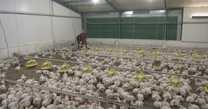
Palestinian chicken farmers in the West Bank suffer from more losses when trying to sell their chickens in the local market, as they find themselves forced to sell it at even less than cost price, to be able to compete with Israeli chickens smuggled from nearby settlements, as the Palestinian Authority is unable to control the market.
Huge Loss
With his heart full of sorrow, Palestinian farmer Faheem Ibrahim told the Palestinian Information Center’s reporter, “The price of a chick aged one day is three NIS, and we keep feeding it for 40 days, and the final cost for one kilo of meat is eight NIS (One USD equals 3.80 NIS).”
He continues, “We are forced to sell at six NIS per kilo with a total loss of 2 NIS per kilo, to be able to compete with Israeli chickens smuggled from nearby Israeli settlements. We do this to avoid having huge numbers of unsold chickens, which will result in a greater loss for us. We have been experiencing this since the beginning of the year. I have suffered financial losses estimated at 1.8M NIS so far.”
The Problem
Farmers stress that the problem lies in exporting chickens by big merchants from the Israeli occupation, especially from Israeli settlements, with a total price of three NIS per kilo, which forces local farmers to sell at a low price.”
Palestinian farmer Khalid Ibrahim believes that the Ministry of Agriculture is responsible for this problem (Which is in charge of this sector). He said: “The Ministry is fully aware of the situation of chicken farmers and knows the number of chickens available at the farms.”
He wondered who would benefit from smuggling Israeli chickens from nearby settlements to the Palestinian market. He added, “We knew that this smuggling only takes place at the hands of official Palestinian institutions or in a situation where there is no taxes, and prices monitoring.”
Palestinian farmer Ahmed Abulrub commented, “The chicken farms sector is complicated to some extent. We invested in this sector to support the national product and to dispense with exported products. Yet, the current Palestinian system does not give new opportunities for investment at a time a very limited number of people control the whole sector.”
Ordinary Citizens Get No Benefit
The Nablus-based agricultural Engineer Khalid Mansour told the PIC, “As a citizen, I don’t see any difference in chicken prices, because the price at chicken farms is low compared to the market. Merchants buy chickens at lower prices and sell them at higher prices to some extent. That’s why the profits farmers should get are taken by merchants, who make huge profits at the expense of farmers.”
He called for passing laws, which prevent merchants from gaining much profits at the expense of farmers, “who suffer from the pressure of promoting their products and find themselves forced to sell at a price proposed by the merchants.”
He pointed out, “A very important problem needs to be addressed: Our market is open for Israeli products, which negatively impact our national products.”
Appeal
The owners of chicken farms across the West Bank have submitted an appeal to the Palestinian Prime Minister Ramy Alhamdallah, in which they urged him to stop the continuing worsening situation at chicken farms and to take necessary decisions and measures, and to give instructions to concerned officials and bodies, to support farmers and find solutions for their problems.”
The farmers explained in their appeal that after following with the Ministry of Agriculture and the Customs Department, they realized that both bodies are aware of what is going on of smuggling chickens from Jewish settlements to the Palestinian market via well-known agents and merchants.”
Huge Loss
With his heart full of sorrow, Palestinian farmer Faheem Ibrahim told the Palestinian Information Center’s reporter, “The price of a chick aged one day is three NIS, and we keep feeding it for 40 days, and the final cost for one kilo of meat is eight NIS (One USD equals 3.80 NIS).”
He continues, “We are forced to sell at six NIS per kilo with a total loss of 2 NIS per kilo, to be able to compete with Israeli chickens smuggled from nearby Israeli settlements. We do this to avoid having huge numbers of unsold chickens, which will result in a greater loss for us. We have been experiencing this since the beginning of the year. I have suffered financial losses estimated at 1.8M NIS so far.”
The Problem
Farmers stress that the problem lies in exporting chickens by big merchants from the Israeli occupation, especially from Israeli settlements, with a total price of three NIS per kilo, which forces local farmers to sell at a low price.”
Palestinian farmer Khalid Ibrahim believes that the Ministry of Agriculture is responsible for this problem (Which is in charge of this sector). He said: “The Ministry is fully aware of the situation of chicken farmers and knows the number of chickens available at the farms.”
He wondered who would benefit from smuggling Israeli chickens from nearby settlements to the Palestinian market. He added, “We knew that this smuggling only takes place at the hands of official Palestinian institutions or in a situation where there is no taxes, and prices monitoring.”
Palestinian farmer Ahmed Abulrub commented, “The chicken farms sector is complicated to some extent. We invested in this sector to support the national product and to dispense with exported products. Yet, the current Palestinian system does not give new opportunities for investment at a time a very limited number of people control the whole sector.”
Ordinary Citizens Get No Benefit
The Nablus-based agricultural Engineer Khalid Mansour told the PIC, “As a citizen, I don’t see any difference in chicken prices, because the price at chicken farms is low compared to the market. Merchants buy chickens at lower prices and sell them at higher prices to some extent. That’s why the profits farmers should get are taken by merchants, who make huge profits at the expense of farmers.”
He called for passing laws, which prevent merchants from gaining much profits at the expense of farmers, “who suffer from the pressure of promoting their products and find themselves forced to sell at a price proposed by the merchants.”
He pointed out, “A very important problem needs to be addressed: Our market is open for Israeli products, which negatively impact our national products.”
Appeal
The owners of chicken farms across the West Bank have submitted an appeal to the Palestinian Prime Minister Ramy Alhamdallah, in which they urged him to stop the continuing worsening situation at chicken farms and to take necessary decisions and measures, and to give instructions to concerned officials and bodies, to support farmers and find solutions for their problems.”
The farmers explained in their appeal that after following with the Ministry of Agriculture and the Customs Department, they realized that both bodies are aware of what is going on of smuggling chickens from Jewish settlements to the Palestinian market via well-known agents and merchants.”
13 dec 2016
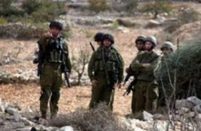
Israeli forces, on Monday, seized an irrigation network in al-Baqa’a area, east of the occupied West Bank city of Hebron, according to local sources.
WAFA correspondence said that Israeli army forces, accompanied by heavy machinery, broke into the area and seized an irrigation network belonging to farmers from the Jaber family.
Local farmers said that seizure of the network was part of a series of Israeli measures, against area dwellers, with the aim of forcing them to evacuate the area for the benefit of expanding nearby Israeli settlements such as Kiryat Arba and Kharsina.
WAFA correspondence said that Israeli army forces, accompanied by heavy machinery, broke into the area and seized an irrigation network belonging to farmers from the Jaber family.
Local farmers said that seizure of the network was part of a series of Israeli measures, against area dwellers, with the aim of forcing them to evacuate the area for the benefit of expanding nearby Israeli settlements such as Kiryat Arba and Kharsina.
11 dec 2016
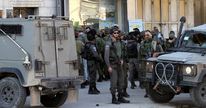
The Israeli occupation forces (IOF) at noontime Sunday stormed Jenin’s eastern town of Deir Abu Da’if, and rummaged into Palestinian commercial stores.
A PIC news correspondent said IOF soldiers aboard several military vehicles rolled into the town and ravaged agricultural stores before they subjected the shopkeepers to intensive questioning.
The IOF reportedly cordoned off the town and set up a military checkpoint at the road between Deir Abu Da’if and al-Jalama checkpoint, where Palestinian vehicles and IDs were subjected to exhaustive inspection.
A PIC news correspondent said IOF soldiers aboard several military vehicles rolled into the town and ravaged agricultural stores before they subjected the shopkeepers to intensive questioning.
The IOF reportedly cordoned off the town and set up a military checkpoint at the road between Deir Abu Da’if and al-Jalama checkpoint, where Palestinian vehicles and IDs were subjected to exhaustive inspection.
8 dec 2016
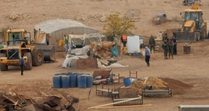
Israeli authorities ordered Palestinian residents of Ras al-Ahmar locality, in the northern Jordan Valley, not to build power lines in their area, a local official said.
Mu’taz Bsharat, who monitors settlement activities in the area, told WAFA correspondence that Israeli troops served locals with an order to stop the construction of a 600-meter-long power line along the road leading to Ras al-Ahmar.
Residents of the area considered part of Area C, which is under full Israeli military control, are not allowed to build power lines or water pipes to their villages. They say that Israel wants to push them out of their land, to eventually take it over for the construction of Jewish-only settlements.
The Jordan Valley makes up about one third of the total area of the occupied West Bank.
Mu’taz Bsharat, who monitors settlement activities in the area, told WAFA correspondence that Israeli troops served locals with an order to stop the construction of a 600-meter-long power line along the road leading to Ras al-Ahmar.
Residents of the area considered part of Area C, which is under full Israeli military control, are not allowed to build power lines or water pipes to their villages. They say that Israel wants to push them out of their land, to eventually take it over for the construction of Jewish-only settlements.
The Jordan Valley makes up about one third of the total area of the occupied West Bank.
7 dec 2016
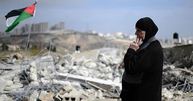
The Israeli bulldozers demolished on Wednesday two car-washes to the north of Jerusalem under the pretext of building without a permit.
Nawal Barakat, al-Nabi Samuel Organization member, said that the Israeli occupation forces (IOF) escorted the Israeli bulldozers that razed a car-wash to the north of Nabi Samuel village.
Quds Press quoted Barakat as saying that the car-wash belongs to her son Laith and constitutes his sole source of income along with four of his friends.
She pointed out that the car-wash place was established two years ago and demolished four times.
The Israeli occupation forces target Palestinians in Nabi Samwil village to pressure them to leave while the media outlets are ignoring the village suffering.
In the same context, Ismail Abu Rabah, a resident of Khalaila suburb, told the Quds Press that the Israeli bulldozers demolished another car-wash belonging to Mahmoud Alqam.
He pointed out that Alqam had appointed a lawyer to follow up a notification for the demolition of his car-wash but the Israeli bulldozers destroyed the place that provides the only sustenance for his family.
Nawal Barakat, al-Nabi Samuel Organization member, said that the Israeli occupation forces (IOF) escorted the Israeli bulldozers that razed a car-wash to the north of Nabi Samuel village.
Quds Press quoted Barakat as saying that the car-wash belongs to her son Laith and constitutes his sole source of income along with four of his friends.
She pointed out that the car-wash place was established two years ago and demolished four times.
The Israeli occupation forces target Palestinians in Nabi Samwil village to pressure them to leave while the media outlets are ignoring the village suffering.
In the same context, Ismail Abu Rabah, a resident of Khalaila suburb, told the Quds Press that the Israeli bulldozers demolished another car-wash belonging to Mahmoud Alqam.
He pointed out that Alqam had appointed a lawyer to follow up a notification for the demolition of his car-wash but the Israeli bulldozers destroyed the place that provides the only sustenance for his family.
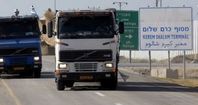
The Israeli occupation authorities (IOA) opened Tuesday the Karem Abu Salem crossing to allow the entry of 630 trucks loaded with foodstuff and aid into the blockaded Gaza Strip.
Director of Abu Salem crossing, Muneer al-Ghalban, said 61 trucks carrying gas and fuel entered the Gaza Strip. 11 more tucks are loaded with solar energy for Gaza’s power plant.
Al-Ghalban added that 30 trucks carrying fruits, 43 trucks carrying fodder and grain, 120 trucks loaded with foodstuff and commercial goods, 10 trucks loaded with cattle and livestock, and 25 others carrying aid items will be allowed access into the enclave.
Reconstruction materials and limited cement quantities are also expected to reach the territory.
Three trucks have, meanwhile, gained access out of Gaza. They carry exports to the occupied West Bank, two among which carrying strawberries and the other carrying household furniture.
Director of Abu Salem crossing, Muneer al-Ghalban, said 61 trucks carrying gas and fuel entered the Gaza Strip. 11 more tucks are loaded with solar energy for Gaza’s power plant.
Al-Ghalban added that 30 trucks carrying fruits, 43 trucks carrying fodder and grain, 120 trucks loaded with foodstuff and commercial goods, 10 trucks loaded with cattle and livestock, and 25 others carrying aid items will be allowed access into the enclave.
Reconstruction materials and limited cement quantities are also expected to reach the territory.
Three trucks have, meanwhile, gained access out of Gaza. They carry exports to the occupied West Bank, two among which carrying strawberries and the other carrying household furniture.
6 dec 2016
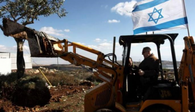
Israeli soldiers invaded, Tuesday, Fasayel village, north of the West Bank city of Jericho, and demolished several residential sheds.
Several army vehicles and bulldozers invaded the village after surrounding it, and demolished residential sheds belonging to residents Abdul-Hadi Ali Obeyyat, Adnan Ibrahim Abu Kharabeesh, Zeid Mahmoud Abu Kharabeesh.
After the invasion and destruction of the properties, a committee composed of Sabah Abu Rashed, the head of the Economy Department in the Jericho District, Mos’ab Thafer, the representatives of the International Red Cross, Raed al-Qatrawi, the representative of the Red Crescent, and Ismael Abu Kharabeesh, the representative of the Local Council, visited the site, to estimate the damages and attempt to find alternatives.
Several army vehicles and bulldozers invaded the village after surrounding it, and demolished residential sheds belonging to residents Abdul-Hadi Ali Obeyyat, Adnan Ibrahim Abu Kharabeesh, Zeid Mahmoud Abu Kharabeesh.
After the invasion and destruction of the properties, a committee composed of Sabah Abu Rashed, the head of the Economy Department in the Jericho District, Mos’ab Thafer, the representatives of the International Red Cross, Raed al-Qatrawi, the representative of the Red Crescent, and Ismael Abu Kharabeesh, the representative of the Local Council, visited the site, to estimate the damages and attempt to find alternatives.

Several illegal Israeli colonists bulldozed and uprooted, on Tuesday morning, more than 40 Dunams of Palestinian agricultural lands, in Ein Jaloud village, south of the northern West Bank city of Nablus.
Ghassan Daghlas, a Palestinian official in charge of settlement’s files in the northern part of the West Bank, said the colonists used various bulldozers to uproot the lands, located in the eastern area of the village.
Daghlas added that the lands are also only 40 meters from an Israeli colony, known as Yesh Kodesh, illegally built on Palestinian lands.
On Monday evening, the soldiers invaded the lands and confiscated keys of many Palestinian tractors, before allowing the illegal colonists to invade and uproot several areas.
Ghassan Daghlas, a Palestinian official in charge of settlement’s files in the northern part of the West Bank, said the colonists used various bulldozers to uproot the lands, located in the eastern area of the village.
Daghlas added that the lands are also only 40 meters from an Israeli colony, known as Yesh Kodesh, illegally built on Palestinian lands.
On Monday evening, the soldiers invaded the lands and confiscated keys of many Palestinian tractors, before allowing the illegal colonists to invade and uproot several areas.
